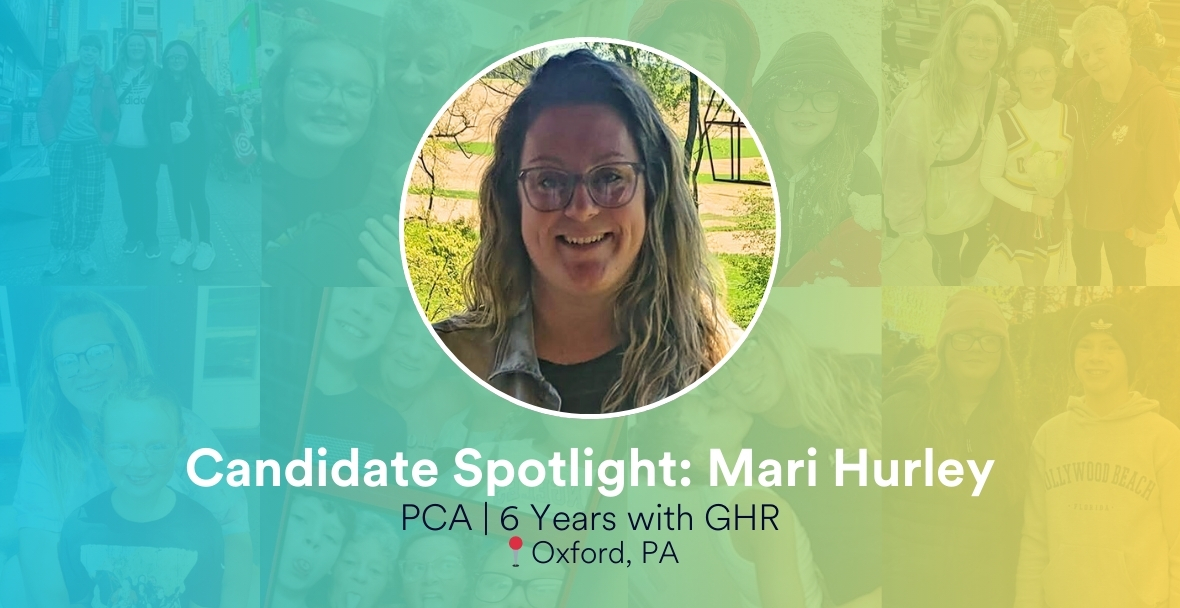
New Year, New Goals: Career Growth for School SLPs in 2025
January 9, 2025
With 2025 now underway, school-based Speech-Language Pathologists (SLPs) have a unique opportunity to reflect on their professional journeys and set new, meaningful goals that will elevate both their career development and the impact they have on students. The start of the new year offers a fresh start, making it the ideal time to consider what you want to achieve as an SLP in a school setting. Whether you aim to hone your clinical skills, improve your work-life balance, advance into leadership roles, or seek further specialization, having clear and actionable goals will guide your professional growth and lead to a more fulfilling career.
At GHR Education, we understand School SLPs' vital role in supporting students' academic, social, and emotional success. As schools continue to face evolving challenges, including shifts in education technology, increasing diversity in student needs, and rising demand for speech and language services, the role of the SLP becomes even more critical. With 2025 in full swing, it's important to align your career goals with the evolving education landscape while focusing on personal and professional growth.
This blog will guide you through setting effective career objectives for 2025. From pursuing additional certifications and professional development opportunities to improving time management and enhancing your impact on student outcomes, this article will offer strategies to help you make the most of 2025 and achieve your professional aspirations.
1. Reflecting on the Past Year: Where Are You Now?
Before diving into new goals for 2025, take a moment to reflect on the past year. Reflection is essential in setting realistic and meaningful goals for the year ahead. Ask yourself a few questions to assess your current position:
- What were your biggest accomplishments in 2024? Did you complete a challenging case that had a positive impact on your students? Were there any new skills or strategies you implemented that helped you become more effective in your role? Perhaps you took on additional responsibilities or collaborated with other educators in new ways.
- Where did you encounter challenges? The school setting can be fast-paced and stressful, and there may have been times when balancing caseloads, administrative tasks, and student needs felt overwhelming. Reflecting on these moments of difficulty can help you identify potential areas for improvement.
- What are your strengths as an SLP? Take note of your clinical strengths—perhaps you excel at diagnosing communication disorders or developing individualized education programs (IEPs). Recognizing your strengths allows you to focus on amplifying them in the coming year.
- What areas need further growth or attention? Are there particular student populations you feel less equipped to serve, such as English language learners, students with autism spectrum disorder (ASD), or students with significant speech or language delays? Maybe you'd like to improve your skills with specific therapy techniques or develop better time management strategies to juggle the demands of your caseload.
Reflecting on these questions will help you better understand where you currently stand and where you want to go, providing clarity on the goals you need to set for 2025.
2. Setting SMART Goals for 2025
Once you've reflected on the previous year, it's time to set new goals that will drive your professional development in 2025. The SMART goal framework (Specific, Measurable, Achievable, Relevant, and Time-bound) provides a structure for setting clear, actionable goals that are grounded in reality and can be tracked over time.
Continuing Education and Certifications
For school-based SLPs, one of the most effective ways to stay current and grow in your profession is through continuing education. School settings require flexibility and the ability to meet the needs of diverse student populations, so expanding your knowledge base and skills will help you adapt to the changing landscape of education.
Pursue Specialized Certifications: School-based SLPs can explore various specialties, such as augmentative and alternative communication (AAC), autism spectrum disorder (ASD), or early childhood speech therapy. Earning a certification in one of these areas can expand your expertise, enhance your value as an educator, and open new career opportunities while better meeting students' needs.
Engage in Professional Development: The field of speech-language pathology is constantly evolving, with new research and tools emerging regularly. In 2025, try to make it a goal to attend at least one professional development workshop, conference, or webinar focused on cutting-edge practices in the field. Learning new assessment tools or exploring innovative therapeutic strategies can help you stay sharp and current with the latest trends and evidence.
Pursue an Advanced Degree: If you're looking to advance your career and explore leadership positions, consider pursuing an advanced degree such as a Master's in Education (M.Ed.), Leadership in Education, or even a Doctorate in Speech-Language Pathology. A higher degree will equip you with the knowledge to take on more responsibilities within a school district or organization, opening the door to roles such as supervisor, coordinator, or even a faculty position at a university.
Enhancing Clinical Skills and Student Outcomes
School SLPs are tasked with meeting the diverse needs of students in a classroom setting, where the goal is not just to treat speech and language disorders but also to help students succeed academically and socially. Improving your clinical skills can help you make a more significant impact on student outcomes. School SLPs are tasked with meeting the diverse needs of students in a classroom setting. The goal is not just to treat speech and language disorders but also to help students succeed academically and socially. Improving your clinical skills can help you make a greater impact on student outcomes.
Refine Your Therapy Techniques: In 2025, consider setting a goal to refine or learn new therapy techniques that can improve the way you serve your students. For example, incorporating more play-based therapy for younger students or learning new speech therapy approaches for students with hearing impairments could enhance your ability to address a broader range of disorders. Look for resources such as webinars, books, or even online communities of SLPs to explore new methods.
Focus on IEP Development and Collaboration: One key aspect of being an SLP in a school setting is creating and implementing Individualized Education Programs (IEPs). Set a goal to streamline your IEP writing process and ensure effective collaboration with teachers, parents, and other professionals. Strong IEPs can make a significant difference in the educational progress of students with speech and language disorders.
Work with Diverse Populations: Many School SLPs work with students from diverse linguistic and cultural backgrounds. Make it a goal to expand your skill set in areas such as bilingual speech therapy, understanding cultural differences in communication, or learning strategies to support English Language Learners (ELL). The more you can adapt your approach to meet the needs of all students, the more effective you will be as an SLP.
Time Management and Work-Life Balance
The demands of being a School SLP can sometimes feel overwhelming, particularly during busy periods such as IEP meetings, assessments, and caseload management. As you set your goals for 2025, it's crucial to prioritize improving time management and achieving a healthy work-life balance. Burnout is common in the field, so maintaining your well-being is key to long-term success.
Develop Efficient Time Management Strategies: In a school setting, you may juggle therapy sessions, meetings, paperwork, and collaboration with other educators all in one day. To improve your workflow, set a goal to refine your time management strategies. Use scheduling tools, prioritize daily tasks, and group similar activities to increase productivity. Allocating specific time blocks for each task will help you stay focused and organized.
Prioritize Self-Care: As a caregiver for your students, taking care of yourself is essential. Burnout and stress are common among school-based SLPs, and setting goals that prioritize your mental and physical well-being is key. Consider setting boundaries for work hours, engaging in regular physical activity, or establishing a relaxation and stress management routine. Whether it's yoga, journaling, or simply spending time with loved ones, ensuring you take care of your own needs will ultimately make you a more effective clinician.
Set Realistic Expectations: One of the challenges of working in a school environment is the pressure to do it all. You may be tasked with addressing numerous students with varying needs, and it can be easy to feel stretched thin. It's important to set realistic expectations for what you can accomplish in a given day or week. This might include reassessing your caseload, seeking support when needed, or delegating tasks that others can help with.
Career Advancement and Networking
As you think about your goals for 2025, also consider where you'd like your career to take you in the long term. Whether you're looking to move into a leadership position, take on a role in policy or advocacy, or explore new career paths, setting goals related to your professional growth is key to achieving career satisfaction.
Seek Leadership Opportunities: If you're interested in advancing your career in 2025, consider seeking leadership opportunities within your school district. These could include taking on roles such as Lead SLP, mentoring new professionals, or even participating in district-wide decision-making committees. Leadership roles not only allow you to make a broader impact, but also provide opportunities for professional growth and development.
Build Professional Relationships: Networking with colleagues, administrators, and other professionals in the field can open doors to new opportunities. Set a goal to attend conferences, join SLP associations, or connect with others in your community. A strong professional network can keep you informed about job openings, best practices, and new opportunities in education and healthcare.
3. Achieving Your Goals: Tracking Progress and Accountability
Setting goals is just the first step. To ensure you achieve your career objectives in 2025, it's critical to break them down into actionable steps and track your progress. This may include creating a timeline, setting milestones, and regularly evaluating your achievements. You may also seek support from mentors, supervisors, or colleagues who can hold you accountable and offer guidance when needed.
4. Celebrating Success and Adjusting Goals
As you move through the year, celebrate your successes, big or small. Achieving your goals will take dedication, perseverance, and time, but it's vital to acknowledge your progress along the way. Additionally, be open to adjusting your goals as needed based on changing circumstances or new opportunities.
Looking Ahead to a Successful 2025
As a School SLP, the new year offers endless opportunities for growth and advancement. Whether you're focused on gaining new certifications, enhancing your clinical skills, improving time management, or advancing into leadership positions, setting clear, achievable goals will provide direction and focus for your career in 2025.
At GHR Education, we are committed to supporting you succeed in your School SLP career. Here's to a productive and rewarding year ahead!


